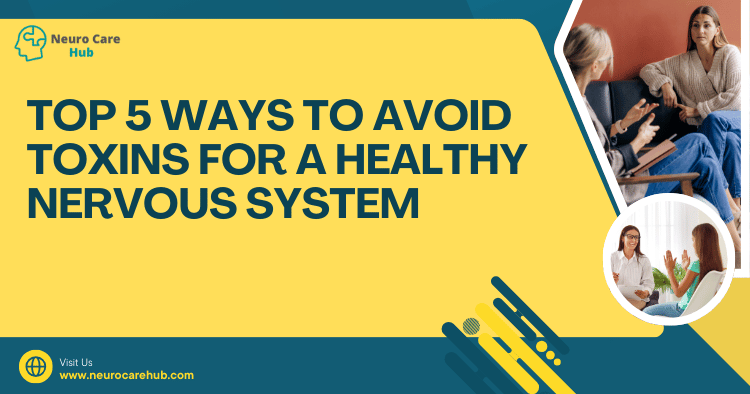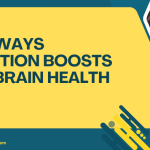Table of Contents
- Understanding Toxins and Their Impact on the Nervous System
- 1. Prioritize Organic Foods
- 2. Minimize Exposure to Household Chemicals
- 3. Be Cautious with Personal Care Products
- 4. Filter Your Drinking Water
- 5. Reduce Stress and Practice Mindfulness
- FAQs
Understanding Toxins and Their Impact on the Nervous System
Toxins are harmful substances that can disrupt bodily functions, and the nervous system is particularly vulnerable. Chronic exposure to toxins can lead to neurodegenerative diseases, cognitive decline, and mood disorders. Common sources of toxins include pesticides, heavy metals, and chemicals found in household products. Understanding the impact of these substances is the first step toward protecting your nervous system.
“Awareness is the first step toward prevention. Understanding where toxins come from empowers you to make healthier choices.”
1. Prioritize Organic Foods
Eating organic is not just a trend; it’s a proactive way to reduce your exposure to harmful pesticides and chemicals. Organic farming practices limit the use of synthetic fertilizers and pesticides, which can have detrimental effects on your nervous system.
Why Go Organic?
- Reduced Chemical Exposure: Organic produce contains fewer harmful residues.
- Higher Nutritional Value: Studies suggest organic foods may have higher levels of antioxidants.
- Environmental Benefits: Organic farming supports biodiversity and reduces soil degradation.
Tips for Choosing Organic:
- Look for the USDA Organic seal.
- Shop at local farmers’ markets to find fresh, organic produce.
- Consider the “Dirty Dozen” list from the Environmental Working Group (EWG), which identifies fruits and vegetables with the highest pesticide residues.
“Choosing organic not only benefits your health but also supports sustainable farming practices that protect the environment.”
For more information on the benefits of organic foods, check out the Organic Trade Association.
2. Minimize Exposure to Household Chemicals
Your home can be a hidden source of toxins. Many household cleaners, air fresheners, and even furniture emit harmful chemicals known as volatile organic compounds (VOCs).
How to Create a Safer Home Environment:
- Choose Natural Cleaning Products: Opt for vinegar, baking soda, or essential oils for cleaning.
- Ventilate Regularly: Open windows to reduce indoor air pollution.
- Declutter: Reducing clutter can minimize dust, which may contain various toxins.
Recommended Natural Products:
| Product Type | Natural Alternative |
|---|---|
| Glass Cleaner | Vinegar and water mix |
| All-Purpose Cleaner | Baking soda and lemon juice |
| Air Freshener | Essential oil diffusers |
“Your home should be a sanctuary. By choosing natural products, you create a healthier environment for yourself and your loved ones.”
For a thorough guide on household toxins, visit The National Institute of Environmental Health Sciences.
3. Be Cautious with Personal Care Products
Many personal care items, such as shampoos, lotions, and cosmetics, can contain harmful chemicals like parabens, phthalates, and formaldehyde. These substances can interfere with hormone balance and nervous system function.
Tips for Safer Personal Care:
- Read Labels Carefully: Look for products free from harmful ingredients.
- Choose Natural Brands: Brands like Dr. Bronner’s or Burt’s Bees prioritize natural ingredients.
- DIY Options: Consider making your own personal care products using natural ingredients.
Resources for Safer Choices:
- Consult the Environmental Working Group’s Skin Deep Database to find safer personal care products.
“Your skin absorbs what you apply to it, so opt for products that nourish rather than harm your body.”
4. Filter Your Drinking Water
Tap water can contain a cocktail of contaminants, including heavy metals, pesticides, and bacteria. These toxins can negatively impact your nervous system over time.
Benefits of Water Filtration:
- Improved Taste and Smell: Filtered water often tastes better.
- Reduced Contaminants: Filters can remove harmful substances like lead and chlorine.
- Enhanced Hydration: Clean, pure water aids in optimal body function.
Types of Water Filters:
| Filter Type | Best For |
|---|---|
| Activated Carbon | Removing chlorine and sediment |
| Reverse Osmosis | Eliminating heavy metals and toxins |
| Distillation | Removing bacteria and other impurities |
“Investing in a water filter is an investment in your long-term health. Clean water is essential for a healthy nervous system.”
For a deeper understanding of water quality, visit the U.S. Environmental Protection Agency.
5. Reduce Stress and Practice Mindfulness
While toxins are a significant concern, mental health plays a vital role in the health of your nervous system. Chronic stress can exacerbate the impact of toxins and lead to inflammation.
Strategies for Stress Reduction:
- Mindfulness Meditation: Practicing mindfulness can improve your ability to manage stress. For techniques on mindfulness, refer to our article on Top 5 Ways to Integrate Neuro Care into Your Wellness Routine.
- Physical Activity: Regular exercise releases endorphins, which help combat stress. Check out the Top 7 Exercises to Boost Your Neurological Health for ideas.
- Connection with Nature: Spending time outdoors has been shown to reduce anxiety and improve mood, which ties into maintaining overall brain health as discussed in Top 5 Lifestyle Changes for Better Neuro Health.
Mindfulness Resources:
- Explore apps like Headspace or Calm for guided meditation and mindfulness practices.
“Mindfulness is not just a practice; it’s a lifestyle choice that can enhance your mental clarity and overall well-being.”
FAQs
Q: How can I tell if a product is toxic?
A: Check product labels for harmful chemicals and look for certifications like “non-toxic” or “organic.” The EWG’s guides can also be helpful.
Q: Are all organic foods safe?
A: While organic foods typically have fewer pesticides, it’s still essential to wash all produce thoroughly to remove any remaining residues.
Q: Can I completely avoid toxins?
A: It’s challenging to eliminate all toxins, but you can significantly reduce your exposure by making informed choices.
Q: How does stress impact the nervous system?
A: Chronic stress can lead to increased inflammation and the release of cortisol, which can harm brain function and overall health.
By adopting these five strategies, you can significantly reduce your exposure to toxins and promote a healthy nervous system. Remember, small changes in your daily routine can lead to significant improvements in your overall well-being. Take charge of your health today!






